|
|
|
Sort Order |
|
|
|
Items / Page
|
|
|
|
|
|
|
| Srl | Item |
| 1 |
ID:
092401
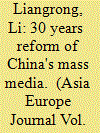

|
|
|
|
|
| Publication |
2009.
|
| Summary/Abstract |
The article reviews the evolution of China's mass media from their status as propaganda tools of the Communist Party to their current commercialized pluralist structure. It notably reviews the changes and rapid growth patterns of popular newspapers and TV programs and the concurrent restructuring of the media industry as well the impact of the Internet.
|
|
|
|
|
|
|
|
|
|
|
|
|
|
|
|
| 2 |
ID:
117555
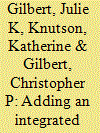

|
|
|
| 3 |
ID:
017967


|
|
|
|
|
| Publication |
Spring 2000.
|
| Description |
15-36
|
|
|
|
|
|
|
|
|
|
|
|
|
|
|
|
| 4 |
ID:
134356
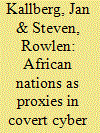

|
|
|
|
|
| Summary/Abstract |
The growth of the African Internet, and services related to the Internet, has been rapid over the last decade. Following this market expansion, a variety of service providers have started to provide access. A fast-growing market puts pressure on the providers to deliver services first and only then seek to secure the networks. Over time, industrialised nations have become more able to detect and trace cyber attacks against their networks. These tracking features are constantly developing and the precision in determining the origin of an attack is increasing. A state-sponsored cyber attacker, such as intelligence agencies and electronic warfare units, will seek to avoid detection, especially when the attacks are politically sensitive intelligence-gathering and intrusion forays into foreign states' networks. One way for the attacker to create a path that links the attacks and the originating country is by actions through a proxy. The less technologically mature developing nations offer an opportunity for cyber aggression due to their lower level of security under the quick expansion of the Internet-based market. Developing countries could be used as proxies, without their knowledge and consent, through the unauthorised usage of these countries' information systems in an attempt to attack a third country by a state-sponsored offensive cyber operation. If the purpose of the cyber attack is to destabilise a targeted society and the attack succeeds, the used proxies are likely to face consequences in their relations with foreign countries, even if the proxy was unaware of the covert activity.
|
|
|
|
|
|
|
|
|
|
|
|
|
|
|
|
| 5 |
ID:
129145
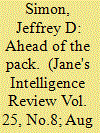

|
|
|
| 6 |
ID:
118386
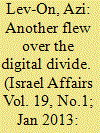

|
|
|
|
|
| Publication |
2013.
|
| Summary/Abstract |
This article is part of a pioneering study which analyses Internet usage by some 600 candidates for heads of 156 local authorities in Israel in the municipal campaigns of 2008. Despite the importance attributed to the municipal elections in the Arab-Palestinian sector in Israel, the high turnout rate, the competitiveness of the elections and the continuing penetration of the Internet, it was scarcely used by candidates, compared to about 50% usage by candidates who competed in municipalities with Jewish populations. Interviews suggest that beyond access gaps, additional obstacles impede the usage of the Internet as an effective political tool in the Arab-Palestinian sector.
|
|
|
|
|
|
|
|
|
|
|
|
|
|
|
|
| 7 |
ID:
165657
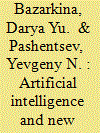

|
|
|
|
|
| Summary/Abstract |
This article analyzes new threats to international psychological security (IPS) posed by the malicious use of artificial intelligence (MUAI) by aggressive actors in international relations and discusses international terrorism as such an actor. Compared with the positive applications of AI, MUAI as related to security threats is a much less studied area.
|
|
|
|
|
|
|
|
|
|
|
|
|
|
|
|
| 8 |
ID:
127926
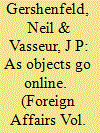

|
|
|
|
|
| Publication |
2014.
|
| Summary/Abstract |
Since 1969, when the first bit of data was transmitted over what would come to be known as the Internet, that global network has evolved from linking mainframe computers to connecting personal computers and now mobile devices. By 2010, the number of computers on the Internet had surpassed the number of people on earth.
|
|
|
|
|
|
|
|
|
|
|
|
|
|
|
|
| 9 |
ID:
100692
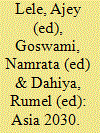

|
|
|
|
|
| Publication |
New Delhi, IDSA, 2011.
|
| Description |
xxv, 342p.
|
| Standard Number |
9781935501220, hbk
|
|
|
|
|
|
|
|
|
|
|
|
Copies: C:2/I:0,R:0,Q:0
Circulation
| Accession# | Call# | Current Location | Status | Policy | Location |
| 055478 | 303.495/LEL 055478 | Main | On Shelf | General | |
| 055479 | 303.495/LEL 055479 | Main | On Shelf | General | |
|
|
|
|
| 10 |
ID:
054174


|
|
|
| 11 |
ID:
139305
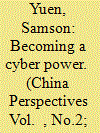

|
|
|
|
|
| Summary/Abstract |
On 21 January 2015, Internet users in China who were trying to access blocked websites and smartphone apps encountered difficulties connecting to virtual private networks (VPNs), a popular circumvention tool for bypassing censorship in a country where government control of online space has been notorious. Astrill, StrongVPN and Golden Frog, three major providers of commercialVPN services that reported service disruptions, all blamed the interference on the Chinese cyberspace authorities. The attack, they claimed, was carried out with a level of sophistication unseen before. (1
|
|
|
|
|
|
|
|
|
|
|
|
|
|
|
|
| 12 |
ID:
120064
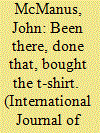

|
|
|
|
|
| Publication |
2013.
|
| Summary/Abstract |
In this article, I explore how the rapid commercialism and commodification of Turkish premier league football has affected the activities of a particular fan group, Çarsi, for the club Besiktas, one of Turkey's oldest teams. I look at how elements of the commodification of football have been harnessed and mediated by Çarsi to make ethical and political statements and convey an anarcho-socialist message. These processes, I argue, are driven by the possibilities opened up by rapid social and technological development. The shift to searching for identity among the forums and video websites of the internet, rather than on the terraces of Besiktas, is profoundly altering how fans construct their allegiance to the fan group and the club. This process, it will be shown, is not so much liberating supporters from the requirements of fandom as it is generating new conventions and processes to which Çarsi members must adhere.
|
|
|
|
|
|
|
|
|
|
|
|
|
|
|
|
| 13 |
ID:
116342


|
|
|
|
|
| Publication |
2012.
|
| Summary/Abstract |
This article undertakes a descriptive analysis of the jihadist group, the Global Islamic Media Front. Using information obtained from cells broken up in the West, it argues that, in addition to its propaganda actions in support of terrorism, the group fulfils three additional functions: (a) It serves as an "identity refuge" for individuals wishing to cultivate an identity as fighters of the jihad; (b) It offers a form of "surrogate activism" to those who fail in their attempts to join organisations engaged in terrorist violence; and (c) It is an important source of violent radicalisation for its own members who become increasingly dissatisfied with their propaganda activities.
|
|
|
|
|
|
|
|
|
|
|
|
|
|
|
|
| 14 |
ID:
095290
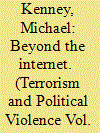

|
|
|
|
|
| Publication |
2010.
|
| Summary/Abstract |
This study challenges the conventional wisdom that the Internet is a reliable source of operational knowledge for terrorists, allowing them to train for terrorist attacks without access to real-world training camps and practical experience. The article distinguishes between abstract technical knowledge (what the Greeks called techne) and practical, experiential knowledge (mtis), investigating how each helps terrorists prepare for attacks. This distinction offers insight into how terrorists acquire the practical know-how they need to perform their activities as opposed to abstract know-what contained in bomb-making manuals. It also underscores the Internet's limitations as a source of operational knowledge for terrorists. While the Internet allows militants to share substantial techne, along with religious and ideological information, it is not particularly useful for disseminating the experiential and situational knowledge terrorists use to engage in acts of political violence. One likely reason why Al Qaeda and other Islamist terrorists have not made better use of the Internet's training potential to date is that its value as a source of operational knowledge of terrorism is limited.
|
|
|
|
|
|
|
|
|
|
|
|
|
|
|
|
| 15 |
ID:
096220
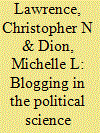

|
|
|
|
|
| Publication |
2010.
|
| Summary/Abstract |
Weblogs (or blogs), as a form of communication on the Internet, have recently risen in prominence but may be poorly understood by both faculty and students. This article explains how blogs differ from other online communication tools and how political science faculty can make use of blogs in their classes. The focus is on using blogs as part of class assignments to reinforce important skills, including critical thinking, political engagement, and essay writing. We also discuss existing academic and professional blogs that may be models for student blogging in political science.
|
|
|
|
|
|
|
|
|
|
|
|
|
|
|
|
| 16 |
ID:
119751
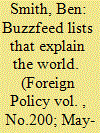

|
|
|
| 17 |
ID:
156147
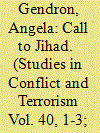

|
|
|
|
|
| Summary/Abstract |
A range of psychological, social, and environmental factors render some individuals more susceptible to militant Islam than others. Research also suggests that there are certain “triggers,” which help to explain why it is that only some individuals exposed to the same societal structural influences turn to violence. This article seeks to contribute to future empirical research in this area by studying the significance of certain “charismatic” preachers in this process and examining the role the Internet plays in strengthening the charismatic bond. Difficulties in defining and measuring “charisma” may help in part to explain the paucity of research on this aspect of radicalization but since charismatic authority derives from the bond between preacher and follower, an examination of the activities, strategies, and techniques used to build relationships and win adherents to Salafi-jihadism may provide valuable insights for countering radicalization.
|
|
|
|
|
|
|
|
|
|
|
|
|
|
|
|
| 18 |
ID:
149044
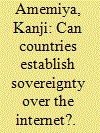

|
|
|
|
|
| Summary/Abstract |
While the Internet is now a component of people's everyday lives and is becoming more and more convenient, it has also brought about various problems and adverse effects that could be damaging to human rights, corporate interests, and even national interests. In order to address these problems and adverse effects, countries have recently begun to establish national boundaries over the Internet to control it. This article will consider whether countries are capable of establishing sovereignty over the Internet. To this end, first the scope of national sovereignty in terms of the physical entities that make up Internet services, namely, providers, users, network equipment, and network facilities will be defined. Then the four methods for establishing national sovereignty over the Internet from the perspective of social phenomena will be examined. In addition, in examining whether it is possible for countries to secure the power to levy taxes over the Internet, the article will consider the requirements for countries to establish sovereignty over the Internet. Finally, an explanation and attempt to elucidate a new phenomenon involving the movement of corporate earnings to the cloud will be offered.
|
|
|
|
|
|
|
|
|
|
|
|
|
|
|
|
| 19 |
ID:
132128
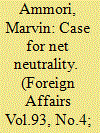

|
|
|
|
|
| Publication |
2014.
|
| Summary/Abstract |
For all the withering criticism leveled at the White House for its botched rollout of HealthCare.gov, that debacle is not the biggest technology-related failure of Barack Obama's presidency. That inauspicious distinction belongs to his administration's incompetence in another area: reneging on Obama's signature pledge to ensure "net neutrality," the straightforward but powerful idea that Internet service providers (ISPs) should treat all traffic that goes through their networks the same. Net neutrality holds that ISPs shouldn't offer preferential treatment to some websites over others or charge some companies arbitrary fees to reach users. By this logic, AT&T, for example, shouldn't be allowed to grant iTunes Radio a special "fast lane" for its data while forcing Spotify to make do with choppier service.
|
|
|
|
|
|
|
|
|
|
|
|
|
|
|
|
| 20 |
ID:
119934


|
|
|
|
|
|
|
|